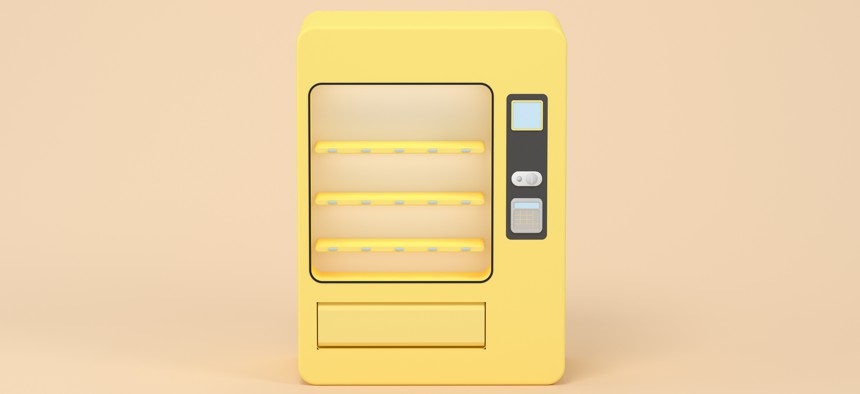How a Vending Machine Prevents Drug Overdoses

Jian Fan via Getty Images
About 600 lives have been saved by a machine in Ohio that stocks overdose treatments and other harm reduction tools, according to a health nonprofit.
After drug overdoses hit an all-time high last year, vending machines that dispense products like overdose-reversal medication and fentanyl test strips started popping up across the country. In Cincinnati, a health nonprofit says one machine has saved hundreds of lives.
Caracole, a Cincinnati-based nonprofit that aims to fight against HIV/AIDS, installed a “harm-reduction vending machine” outside its facility last year, which the CEO Linda Seiter says contributed to reversing nearly 600 overdoses.
“I think that we're proving that this is a pretty compelling project, that it is saving lives and it is preventing disease,” Seiter told Route Fifty in a recent interview
Caracole’s machine is accessible 24/7 and offers safer injection kits that include the opioid overdose treatment Narcan, tourniquets, alcohol pads and other items. The machine also holds safer smoking kits with pipes, lip balms and fentanyl test strips that can be used to identify whether the opioid is in other drugs like methamphetamines. People can also get Narcan or fentanyl test strips “a la carte,” as well as masks, bandages, safer sex kits and pregnancy tests.
All products come with information about HIV prevention, testing and treatment options.
With more than 800 registered users, keeping the machine stocked can be a challenge, but Seiter said she’s thrilled people are taking advantage of the program.
Between May 2020 and April 2021, more than 100,000 people died nationwide as a result of drug overdoses, according to the Centers for Disease Control and Prevention. Now, communities from San Diego to New York City are installing harm-reduction vending machines in the hopes of ensuring people who use drugs have access to potentially life-saving tools.
Harm reduction refers to strategies that minimize the health risks of using drugs, such as contracting HIV or overdosing. It can take many forms, like safe injection sites or syringe exchanges. These kinds of practices have long been in play in Europe and Australia for decades, but have only recently gained traction in the United States.
Last year, New York City established the country's first safe injection site, where people can use drugs in a supervised setting. And the Biden administration ramped up its support for harm reduction as the American Rescue Plan Act included $30 million for such initiatives.
The vending machine approach is a relatively new one in the United States, with the first installed in Las Vegas in 2017.
Several years ago, Caracole first considered installing a vending machine for safer sex products, Seiter explained, but that project never came to fruition. Then when syringe exchange sites briefly shut down during the pandemic, the local nonprofit Interact for Health awarded Caracole a grant, allowing the team to revisit the idea and ultimately create the harm reduction vending machine.
To gain access to the machine, people must speak with someone at Caracole, participate in an anonymous survey and then receive a PIN that can be used once a week for three months to dispense products.
After three months, users need to reregister and get a new code. That’s when the Caracole team collects data asking questions including whether the user needed to use Narcan on themselves or another person. That information helps Caracole track the program’s effectiveness as well as determine what additional items would be beneficial in the future.
The machine is meant to make the products accessible to more people, Seiter said, adding that it’s important to recognize that not everyone who uses drugs is comfortable entering a clinic and speaking with someone to get Narcan or fentanyl test strips.
“I think in terms of harm reduction, there needs to be a whole continuum of options for people,” she said.
The machine has also been a way to get important products to people who smoke drugs rather than inject them, Seiter added. While intravenous drug users might pick up Narcan or test strips at a syringe exchange site, people who smoke have no reason to visit those sites, and more people started using the machine after the safer smoking kits were added.
It’s especially important to ensure people who smoke have access to fentanyl strips, as they – unlike many injection drug users – might not think there’s fentanyl in their drugs, Seiter said.
Seiter encouraged any communities that are considering installing harm reduction vending machines to reach out to Caracole.
“We are absolutely happy to share everything we have, in terms of the specs with the machine, to talk through some of the political implications, the funding [and] the budget,” she said.
Editor's note: This story was updated to clarify that a vending machine for safer sex products was never installed. An earlier version also incorrectly stated that Narcan or fentanyl test strips were available “a la mode,” instead of " a la carte."
Molly Bolan is the assistant editor for Route Fifty.
NEXT STORY: Fewer Car-Deer Crashes with Permanent Daylight Savings






